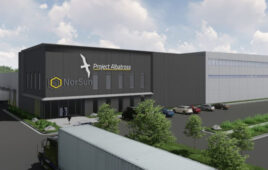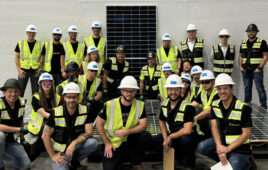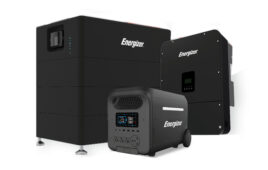The shape of solar mounts is changing, and so too are how they’re attached to rooftops. K2 Systems, a solar racking manufacturer, has integrated a butyl sealant onto a new line of roof mounts. On this episode of Solar Spotlight, Brett Nielsen, VP of products and services at K2, is here to share the rationale behind adopting this sticky new flashing for mounting purposes.
Below is an excerpt of K2 Systems’s Solar Spotlight podcast with Solar Power World, but be sure to listen to the full episode on your favorite podcast app.
SPW: What is K2’s current development strategy for mounts and flashings?

Brett Nielsen, VP of products and services, K2 Systems
Brett Nielsen: What’s exciting today is that while some new technologies and flashing and some new data that we have in direct-to-deck mounting, we’re starting to see customers and installers and engineering firms come around on these things, and it’s opening up a tremendous amount of possibilities. Our strategy right now is to focus on those two things, which is, what are great flexible flashing materials that worked well for us? That means our EverSeal product line. And then exploring and optimizing fastener values, whether that’s into rafter or direct-to-deck. Five, 10 years ago, if you said either of those things, like a flexible flashing and non-metal flashing or direct-to-deck. Most installers in the country would probably shun you or not be interested in the technology, and today that’s really changed.
What is EverSeal?
EverSeal is our trademarked flexible flashing product. It’s a proprietary formula that we’ve been working with. Butyl is a synthetic rubber. It’s been around for almost 100 years. It’s a really common material that’s used in tires and rubber gloves, and you can mess around with the formula of it to add solvents; you can make it more of a liquid or injectable type of butyl; or you can add fillers and polymers to it to add different types of properties to the materials so that it can be more tacky, can be more UV resistant, it can offer better temperature ranges. And so, that’s the type of butyl that we’re working with
Why is Butyl such an ideal material for solar flashings?
I would say the number one reason it’s a great product for this application is that it’s completely proven. It’s been used for decades in a lot of different industries. It’s actually been used for over 30 years in the field around the world as, actually, a solar mount flashing, whether it was for domestic hot water panels, and more recently for photovoltaic panels. It’s field tested and it’s proven.
It’s got great low permeability, meaning it’s not only watertight, it’s airtight. Butyl as a material does not chemically bond to materials. It’s a mechanical bond, and it’s a great mechanical bond. So, the advantage of that is it’s really compatible with different materials. As a mount, one of the things we want to offer to our customers is something that they can put on the shelf, whether it’s a distributor, or it’s an installer, and they can use it in multiple different ways.
How is K2 using Butyl in its new products?
So, with the success of some of the earlier products that we made — so that’s really Splice Foot X and XL — we’ve now launched some additional versions of those products, which is Flex Foot. Not only does the butyl adhesive allow us to make for a much easier and more reliable installation, but our customers are also looking at different types of fasteners. So, a lot of the new products we’re going to launch are going to not only give the option of like roofing material, you can use this mount on a comp roof, you can use it on the flat roof, you can use it on a metal roof or a concrete roof. We’re going to allow our customers to then select the appropriate fastener for that, so that might mean a particular wind zone or snow load.
This podcast is sponsored by K2 Systems






another great job Billy… love the use of butyl in the application.